他のメンバー : 榎本 靖士 岡田 弘隆 吉田 健司 宮崎 明世 金谷 麻理子 古川 拓生 寺山 由美 松元 剛 仙石 泰雄 川村 卓 増地 克之 大根田 修 中山 雅雄 中西 康己 長谷川 聖修 渡邉 仁 奈良 隆章 鍋山 隆弘 鍋倉 賢治 本谷 聡 木塚 朝博 有田 祐二 會田 宏 澤江 幸則 齊藤 まゆみ
キーワード:体育、体育教師教育、カリキュラム論、学習指導論、質
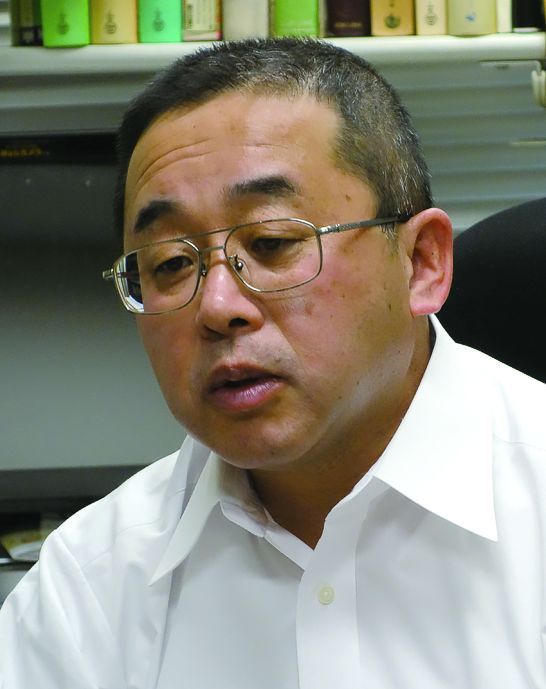 学校の体育は体を動かすだけの授業でなく、一定基準の 運動技能を達成するという目標を持つ、質の高い授業を提供することができると、子供達がやりがいを感じる授業になります。質を保証するには、授業のカリ キュラム、学習指導並びに教師教育という観点から理論化が必要です。しかし、現在、学校体育、大学のコーチングのスペシャリスト、行政をつなげるシステム が存在していません。そのため、リサーチユニット「体育科教育学」により学校、大学、行政をつなぎ質の高い体育授業づくりに取り組むシステムを構築してい きます(図1)。
学校の体育は体を動かすだけの授業でなく、一定基準の 運動技能を達成するという目標を持つ、質の高い授業を提供することができると、子供達がやりがいを感じる授業になります。質を保証するには、授業のカリ キュラム、学習指導並びに教師教育という観点から理論化が必要です。しかし、現在、学校体育、大学のコーチングのスペシャリスト、行政をつなげるシステム が存在していません。そのため、リサーチユニット「体育科教育学」により学校、大学、行政をつなぎ質の高い体育授業づくりに取り組むシステムを構築してい きます(図1)。
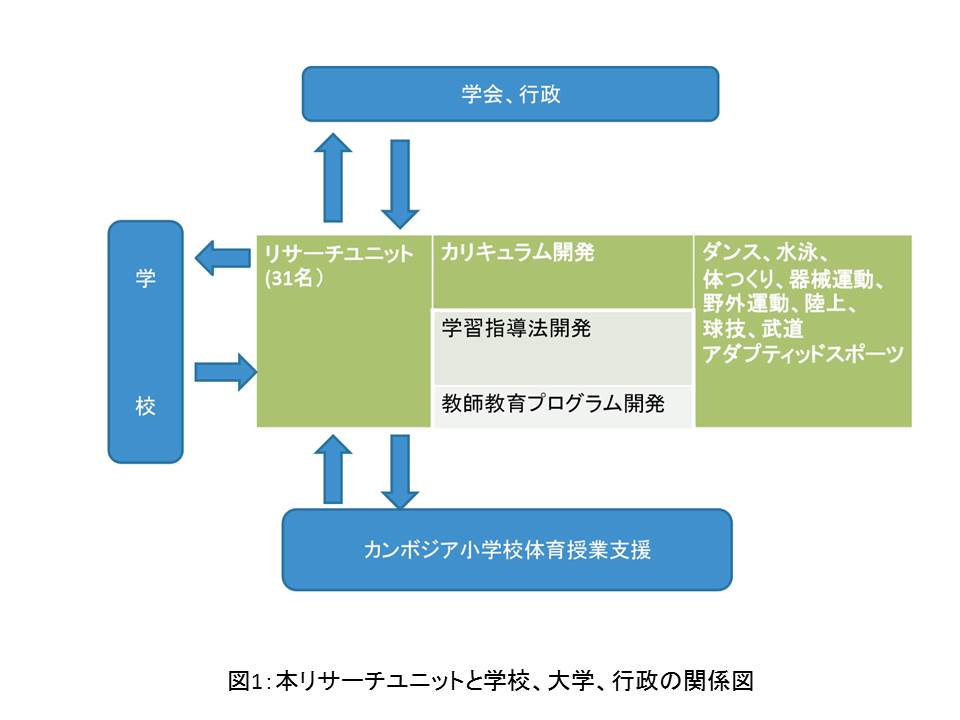
それぞれの専門家との橋渡しに
良の高い体育授業の実現には、良質のカリキュラム、学習指導方法並びに優秀な教員の養成が必要になり、それらを研究しています。カリキュラムモデル、学習 指導モデルを個別競技の専門家と共に開発します。開発した学習指導モデルは、大学内で実施する教師教育関連授業に適用すると共にその効果を評価します。そ の後、教師教育モデルの改善を図り、同時に行政と連携しながら開発したカリキュラムモデルを現職教員の教育プログラムに適用し、その効果の検証、改善に努 めます。また、つくば市内の大学近隣に実験校を複数設定し、実験校と連携しながらカリキュラムモデル、学習指導モデル、並びに教師教育モデルの開発に取り 組むとともに、その成果を教師教育モデルに還元していくことで、モデルの効果検証、改善を図るシステムを構築していきます(図2)。
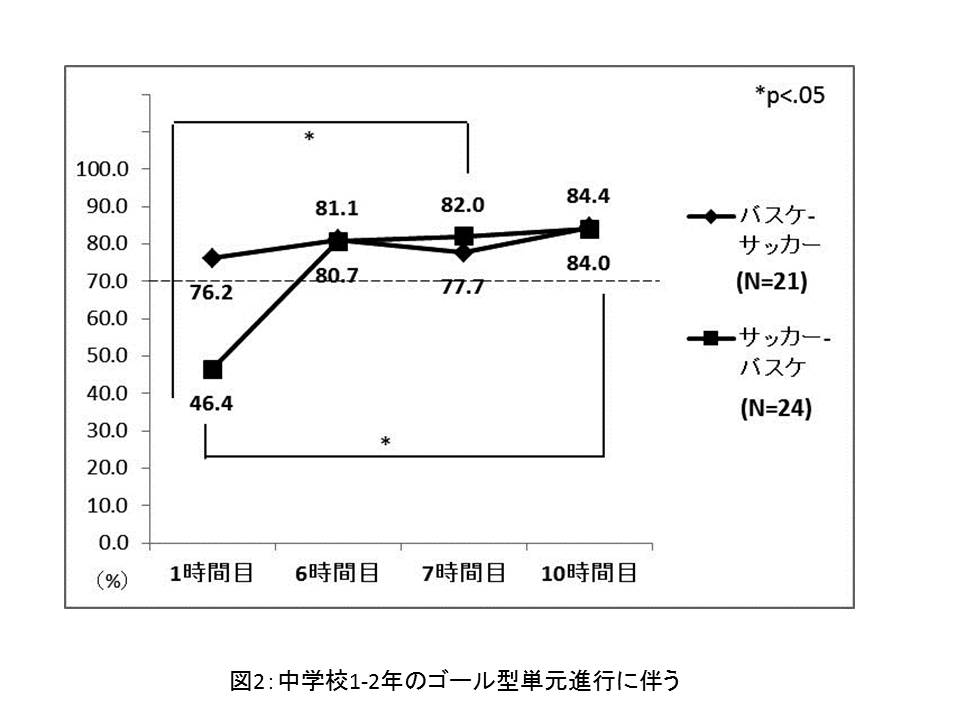
カンボジアから世界へ-体育指導の人材育成-
国連の設定したミレニアム目標の達成に向けて、スポーツを通した開発支援に対する国際的な関心が高まっています。我が国の体育授業の質の高さは、国際的に も評価されており、このリサーチユニットでは体育授業の国際展開をしていきます。平成18年度以降カンボジア王国小学校体育授業支援事業に助言者として参 加しています。カンボジアでは教育の根幹である初等教育で体育指導の普及に関わる人材を選抜し、 指導書を活用するための教養と技術を提供し、人材育成を図ると共に、地域の開発支援を進めていきます(写真1、写真2)。カンボジアでも一人でも多くの子 供に質の良い体育の授業を届け、全国に広め、アジアから世界に広めていきたいと思います。
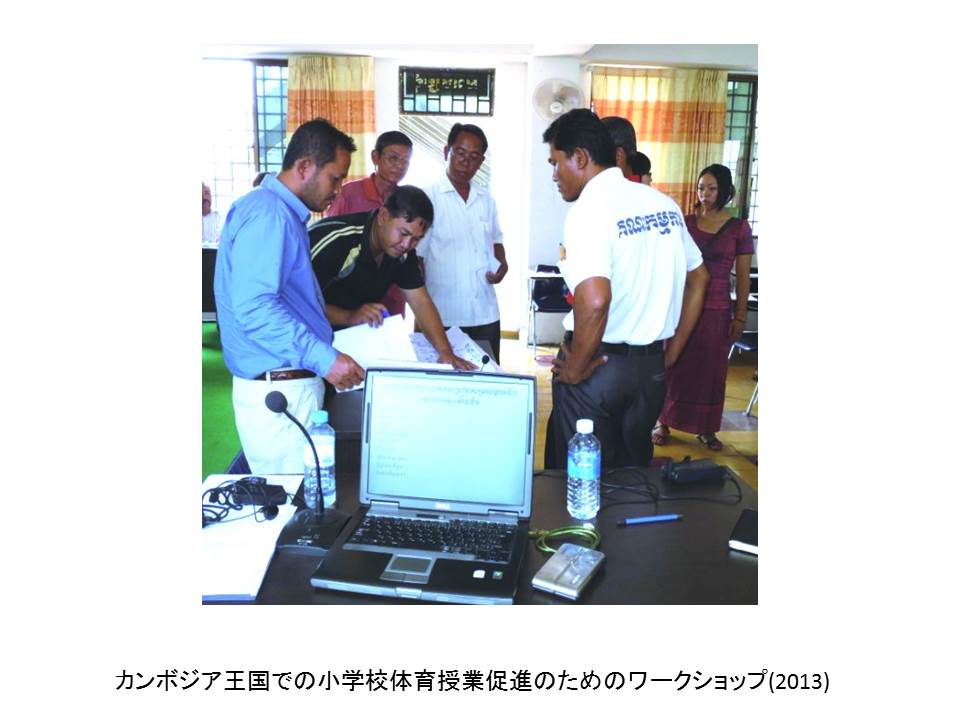
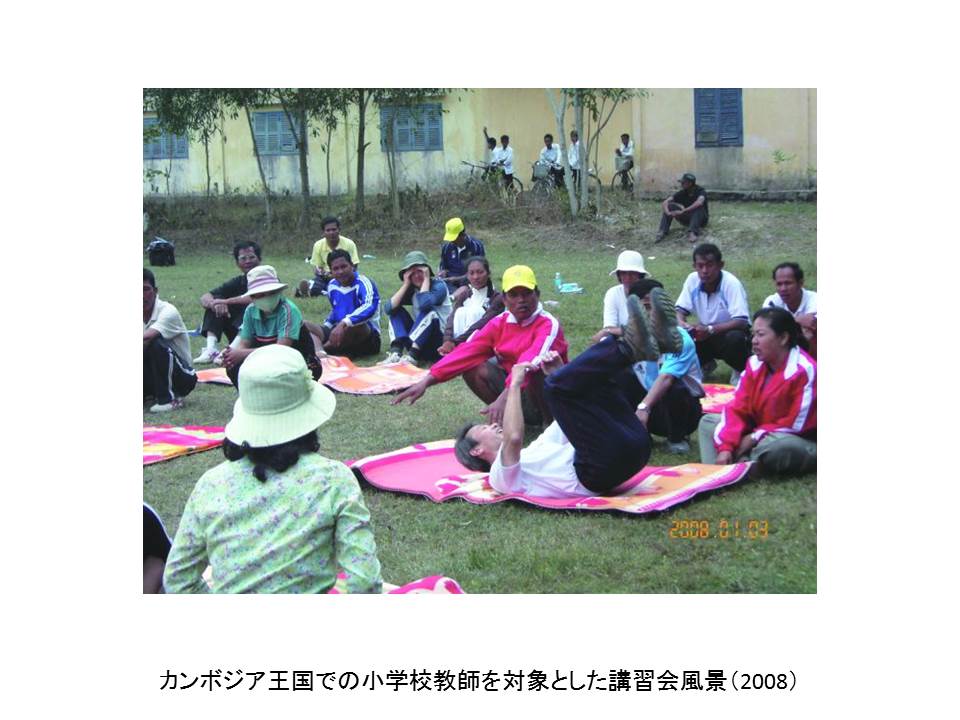
社会への貢献・実績
● 器械運動のプログラムを小学校に提供、有効性の検証
● つくば市内の3中学校において、ボールゲームのパフォーマンスのスタンダード開発
● カンボジア王国小学校体育授業支援事業に助言者として参加
● 茨城県教育委員会と連携し、小学校体育授業のサポート事業、中学校、高校の体育理論指導資料の作成
● 茨城県教育委員会、埼玉県総合教育センター並びに神奈川県体育センターと協同し、体育授業の改善に向けた研究
● つくば市教育委員会、つくば特別支援学校と連携しつくば市立小学校に在籍する特別支援対象児童の体育授業に関する指導助言を実施
(取材:平成25年11月7日)
High-Quality Physical Education with Global Perspectives in Tsukuba : Pedagogy of Physical Education
Unit members : Enomoto, Yasushi Okada, Hirotaka Yoshida, Kenji Miyazaki, Akiyo Kanaya, Mariko Furukawa, Takuo TERAYAMA, Yumi Matsumoto, Tsuyoshi Sengoku, Yasuo Kawamura, Takashi MASUCHI, KATSUYUKI Ohneda, Osamu Nakayama, Masao Nakanishi, Yasumi Hasegawa, Kiyonao Watanabe, Hitoshi Nara, Takaaki Nabeyama, Takahiro Nabekura, Yoshiharu Motoya, Satoshi Kizuka, Tomohiro Arita, Yuji Aida, Hiroshi Sawae, Yukinori Saito, Mayumi
Key words:Physical education, physical education teacher education, curriculum theory, instruction theory, quality
 In in-school physical education, it is possible to motivate students through high-quality programs with goals of achieving certain motor skill levels, in addition to performing exercise. To ensure such a high quality, development of curriculum theory, instruction theory and quality teacher education is essential. However, cooperative systems among schools, coaching specialists working with universities, and administrative institutions have not yet been established in this field. Considering such a situation, this research unit is developing systems to provide high-quality physical education through cooperation among schools, universities, and administrative institutions (Figure 1).
In in-school physical education, it is possible to motivate students through high-quality programs with goals of achieving certain motor skill levels, in addition to performing exercise. To ensure such a high quality, development of curriculum theory, instruction theory and quality teacher education is essential. However, cooperative systems among schools, coaching specialists working with universities, and administrative institutions have not yet been established in this field. Considering such a situation, this research unit is developing systems to provide high-quality physical education through cooperation among schools, universities, and administrative institutions (Figure 1).
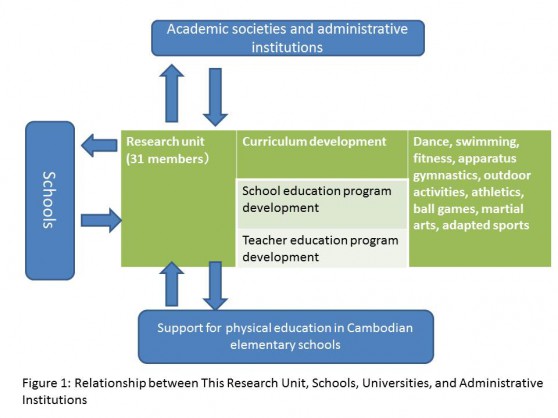
Establishing Liaison among Specialists
We have been engaged in the development of appropriate curricula and instruction theory, as well as the educating expert in teaching in physical education, as it is indispensable models are developed in cooperation with those specialized in teaching in each sports disciplines. Developed instructional models are applied to teacher education program in universities, and their effects are evaluated. Subsequently, the developed teacher education programs are improved, while applying developed curriculum models to educational programs for in-service teacher education program in cooperation with administrative institutions and examining their effects on improvement. Such curriculum models, instructional theory and teacher education program are also developed in cooperation with multiple experimental schools of adjacent universities located in Tsukuba City, with a view to feeding back their outcomes to teacher education program for verification and improvement (Figure 2).
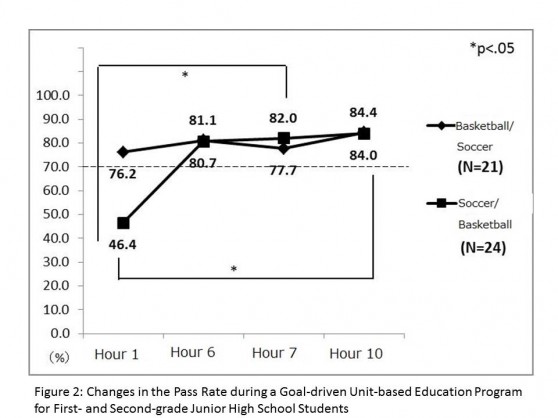
From Cambodia to the World – Human Resource Development for Physical Education –
Toward the achievement of the Millennium Development Goals set by the United Nations, development support through sports has been increasingly focused on throughout the world. As the quality of physical education in Japan is highly evaluated, we are expanding it on a worldwide basis. Since 2006, we have participated in a program to support physical education in elementary schools in the Kingdom of Cambodia as advisors; we have been engaged in human resource development for elementary schools providing basic education, such as selecting those who promote physical education and providing knowledge and skills to appropriately use teaching materials, while actively supporting community-based development (photographs 1 and 2). We aim to provide high-quality physical education for as many children as possible throughout Cambodia, and expand this movement from Asia to the Wor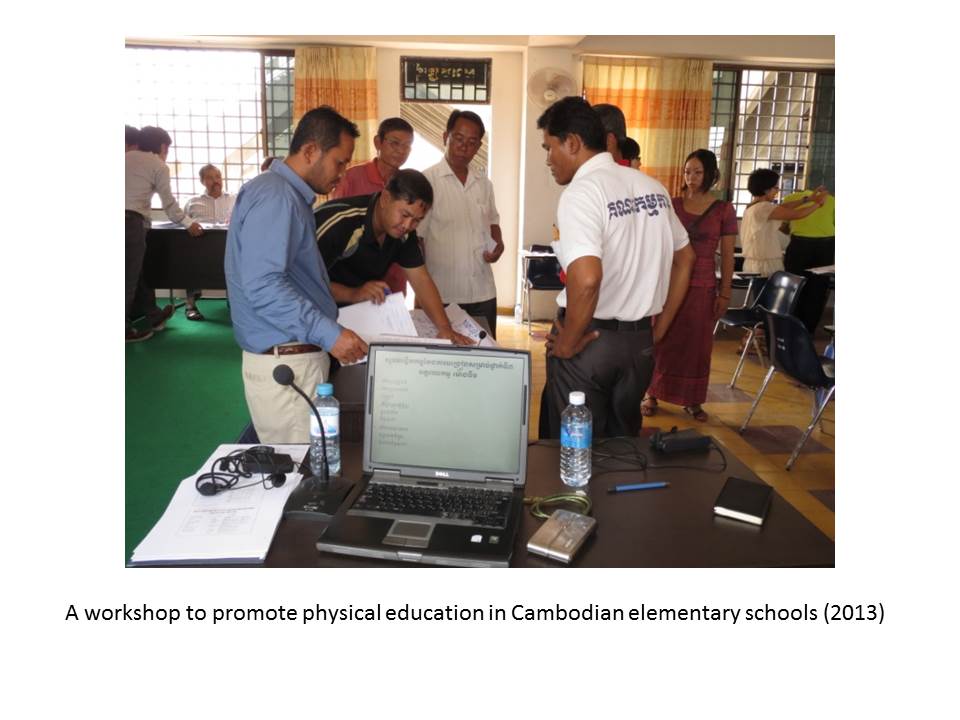
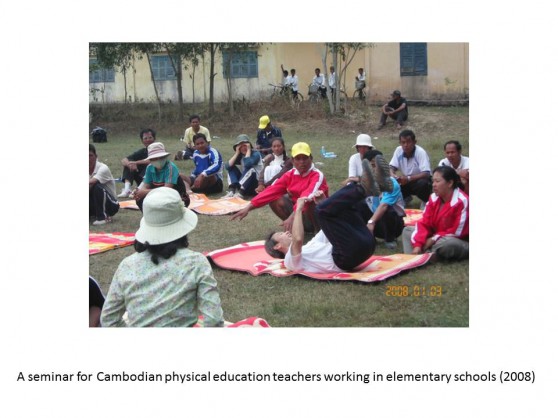
Social contributions and achievements
●Applying apparatus gymnastic programs to elementary schools and examining their effect
●Establishing ball game performance standards in 3 junior high schools located in Tsukuba City
●Participating in a program to support physical education in elementary schools in the Kingdom of Cambodia as advisors
●Supporting physical education in elementary schools, while developing physical education theories and teaching materials for junior and senior high schools in cooperation with the Ibaraki Prefectural Board of Education
●Conducting research for the improvement of physical education in cooperation with the Ibaraki Prefectural Board of Education, Saitama Prefectural Education Center, and Kanagawa Prefecture Taiiku Center
●Providing guidance and advice regarding physical education for children with special needs at Tsukuba Municipal School in cooperation with the Tsukuba City Education Committee and Tsukuba School for Children with Special Needs
